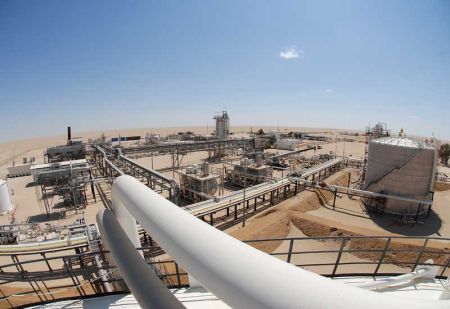
Libyan oil production has resumed more quickly than expected, but the country still has enormous political and technical obstacles to surmount before the situation returns to normal, experts said.
"The market should be ready for Libyan crude," said Abdallah El-Badri, secretary general of the OPEC cartel of oil exporting countries, at a conference last week organised by Oil & Money in London.
Libya, a key African oil exporter, produced about 1.6 million barrels per day (bpd) before the rebellion against Moamer Kadhafi broke out in mid-February. Production then slowed to a trickle.
Around 85 percent of Libyan oil output was exported to Europe, with the disappearance of its high quality light sweet crude from the market one of the reasons why Brent crude from the North Sea has been trading much higher than oil quoted on US exchanges.
OPEC sees member Libya resuming production to one million bpd within six months, while attaining pre-conflict levels by the end of 2012.
"Oil production will come back to the previous level in 15 months or less," said El-Badri.
"There is not much damage to the oil facilities and companies are really moving fast," he added.
Among those fast movers was France's Total, which was the first to restart oil production last month when it resumed work on a platform off the Libyan coast.
"Our return in Libya ... in terms of logistics and oil facilities, it was all quicker than expected," said Total chief executive Christophe de Margerie.
Italy's ENI, the top foreign energy company operating in Libya, resumed pumping gas to Italy through an undersea pipeline last week.
The International Energy Agency, which represents oil consuming nations, is more cautious.
"So far, there are still many conflicting reports about the state of the fields and infrastructure which need to be clarified," it said in a report last week.
It noted that production could be "hemmed in" by damage to the Es Sider terminal, through which a considerable portion of exports flow, with officials estimating repairs could take a year.
Oil fields and ports, in particular Ras Lanouf, "were battlefields" said Shukri Ghanem, who was head of Libya's state-run National Oil Corporation (NOC) before defecting to the rebels in June.
"Only the easy oil can be produced quickly. But after one million barrels (a day) it will be a tougher job to do" because of the need for repairs, he told journalists.
At least $3 billion to $4 billion is needed to restore full production, he estimated.
Other than infrastructure, labour is shaping up to be a problem.
"Libya's reliance on tens of thousands of foreign oil engineers, geologists and technicians, mostly from neighbouring Arab states, South Asia and China, will no doubt be an obstacle to a quick recovery," said Samuel Ciszuk, an analyst at IHS Global Insight.
"Attracting these workers back will invariably take time."
Libyan oil workers have also several times in recent weeks called for the ouster of colleagues and executives seen as too close to the Kadhafi regime.
"Calls for purges at the top of the NOC and in the joint ventures with (foreign oil companies) will hit most on the skill sets needed for a fast recovery," said Ciszuk.
"Every other day experienced people are being sacked," said Ghanem. "It's a big problem."
Ciszuk said "giving in to the temptation to launch wholesale industry purges might seriously derail the country's recovery, although some cleaning up after decades of corruption is badly needed."
He said Libya's National Transitional Council (NTC) was under pressure to review contracts with foreign oil companies signed under Kadhafi.
New deals are unlikely to be signed anytime soon.
The NTC's oil and finance minister, Ali Tarhuni, said last week that new deals would have to wait for a democratically elected government.
Tarhuni pledged to investigate "every penny" of suspicious oil contracts signed under the former regime, responsible for what it described as "unbelievable" corruption.
Source: AFP
We use cookies to improve your experience. By continuing to use our site, you accept our Cookies, Privacy Policy,Terms and Conditions. Close X